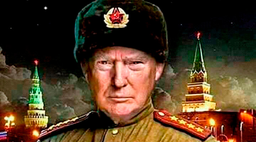Once upon a time, there was a boy named Artyom. He was an ordinary schoolboy from a small town where life moved along quietly: school, friends, playing football in the yard, homework. But one day, his life started to change when major events appeared on the horizon, events that would affect even those living far from big cities and politics.
The war, which was first mentioned on television, soon became a reality for Artyom. His older brother joined the army, his father spoke more and more about patriotism and duty, and people in the streets increasingly discussed the front lines. Artyom didn’t fully understand what was happening, but he felt that something had changed.
Soon, they began teaching Artyom about how great his country was and how it was fighting for a just cause. At school, there were more lessons about patriotism, and the TV constantly showed military parades and speeches from politicians. But one day, Artyom heard a strange song. At first, it was whispered conversations, and then one of the older students played it on their phone. It was a simple song with a catchy tune, but the words “Putin Khuilo” stuck in Artyom’s mind.
He didn’t understand the meaning of the song but sensed that it was unlike other songs about heroism and glory. It felt defiant, crude, even dangerous. The more he tried to understand what those words meant, the more he realized that not everything in the world was black and white, and that even the most powerful people could be doubted.
Time passed, and Artyom grew older. The war, which had seemed distant, eventually took his brother away, never to return. His mother often cried at night, and his father became withdrawn. Artyom began to wonder: What went wrong? What were all the sacrifices for?
The song “Putin Khuilo” began to be sung louder, and even adults, who had once been afraid to talk about politics, now whispered in queues. Artyom realized that the war, which had been glorified on TV, was not as noble as it was made out to be. It brought pain and suffering to many, not just to his family.
Artyom’s story is about a boy who grew up in a world where power and propaganda could make you believe anything. But sooner or later, the truth emerged. This truth was bitter and painful, much like the songs people start to sing to express their pain, protest, and hope for change.

